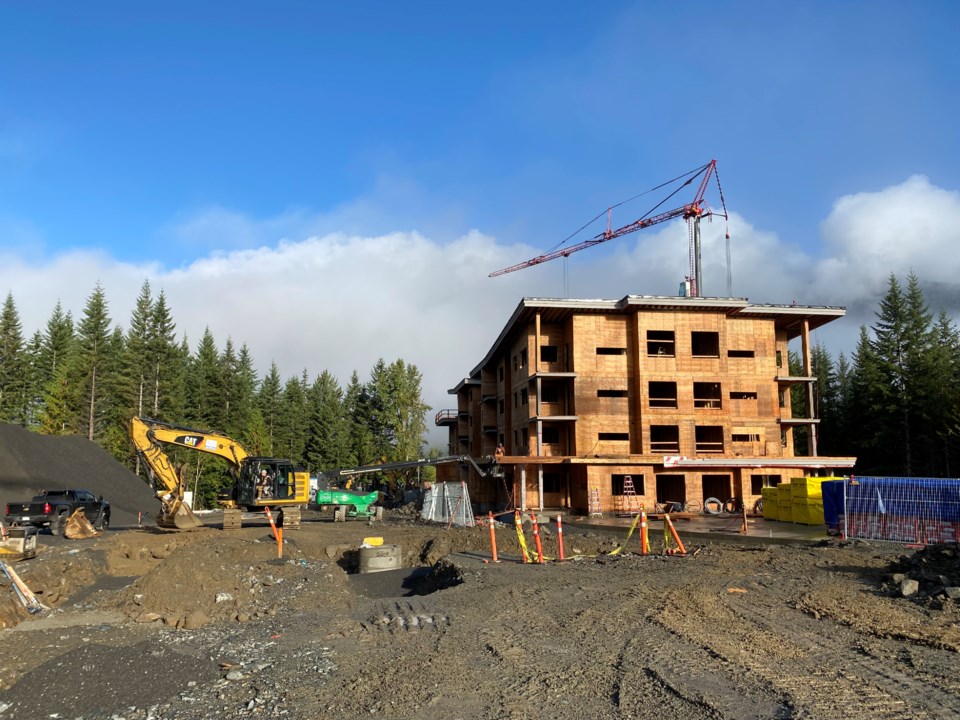I vividly remember sitting in a Resort Municipality of Whistler (RMOW) media briefing—or clarity session, as I sometimes like to refer to them—back in 2017, and listening to a municipal staffer explain the local approach to solving Whistler’s perennial housing woes.
The entire concept of the strategy was to alleviate the pressure points in Whistler’s “housing continuum”—or the way people move from renting to ownership as their lives change and families grow.
At the time, a lack of dorm-style housing for Whistler’s growing seasonal workforce was pushing workers into the rental market, where, with their combined incomes, they were outcompeting resident families and driving rental rates upward.
So families were stuck with what they had—a blockage in the continuum.
The rapid rise in value of market real estate also meant those living in resident-restricted housing couldn’t afford to make the jump to the market, which would free up the resident-restricted stock for a younger family—another blockage.
Listening to the argument all those years ago, the housing continuum strategy made perfect sense, and it still does—if Whistler wants to be successful, it needs appropriate, affordable rental housing for both permanent and seasonal staff, and flexibility and diversity in the housing that’s available for purchase.
It was also in that briefing that the RMOW declared its target of building 1,000 new beds over five years—a goal the municipality is now close to accomplishing.
The progress at Cheakamus Crossing and with private developer employee housing proposals in recent years is commendable, and will go a long way to filling in some gaps.
But looking at Whistler’s housing picture at the outset of 2022, it appears a crucial aspect of the housing continuum is now plugged: the entry point.
“The erosion of market rental housing is distressing. There is no way that we can replace it,” said Councillor Cathy Jewett in an interview with Pique last year. “Every time someone buys a place that has a suite in it and renovates it and takes the suite out, it’s basically a $250,000 hole that we can’t fill. We don’t have the capacity to build as fast as the erosion of suites in rental housing.”
Getting a handle on just how prevalent the loss of market rental suites is or has been in recent years is not easy; the RMOW doesn’t keep track, per se, but a spokesperson said more info will be available with the upcoming release of 2021 Census data.
But looking at some other figures provides some insight.
Since January 2021, there have been 161 homes sold in Whistler, and 49 in Pemberton and the surrounding area. Since 2017, about 496 homes have sold in Whistler—so more than 120 every year, on average.
Also since 2017, about 48 complete demolition permits have been issued for single-family homes in Whistler, according to the RMOW.
Of 31 active permits related to suites, only five are to remove the suite, a spokesperson added—all of the others are to renovate an existing suite or add a new one.
So it’s not all loss, but there is definitely a big shift happening in the market rental stock.
As it relates to home sales, are those new Whistlerites renting out the suites in their shiny new homes to local workers? If they’re demolishing and rebuilding, are they choosing to include a suite in the new floorplan?
Judging from the availability on sites like Craigslist, I’m going to wager a guess that not many are.
And why should they? If they can afford to buy in today’s real estate market, they surely don’t need the extra income. And who wants the stress of becoming a landlord, dealing with rowdy tenants, keeping an eye on repairs and upkeep? But maybe council needs to force the issue.
In Canmore, Alta., amendments to the Land Use Bylaw in 2020 aim to maximize the development of accessory dwelling units—or suites—in the community.
One change in particular decrees that all single-detached dwelling units that include a suite are considered a permitted use.
Homes without a suite are considered a discretionary use, and as such require a development permit. It’s a subtle distinction, but one that incentivizes the creation of auxiliary housing in the development process.
Would something like that work for Whistler? It certainly can’t hurt to try new things, or get creative.
There are of course other factors at play here, too, like the proliferation of nightly rentals and an influx of remote workers choosing to make Whistler home.
Even if you are lucky enough to find a space, you’re not likely to be able to afford it working one, or even two jobs.
Anecdotally, rent is rising everywhere, so it’s not just a Whistler problem—and many will tell you these are just the downsides of living in a desirable ski town.
But as a post in the Whistler Winter Facebook group in early December pointed out, nobody should have to pay $3,400 a month to share a room. Not only is that not sustainable, it’s insulting, and borderline dehumanizing.
When I moved to Whistler in 2014, I had several rental options to choose from, and I am eternally grateful I lucked into renting from a longtime local landlord who is thoughtful and reasonable.
If there were more like her—or some kind of mechanism ensuring the rental of market suites in perpetuity—maybe others wouldn’t feel empowered to charge such exorbitant rates.
Then again, greed isn’t going anywhere, nor is the desirability of Whistler.
The municipality’s own modelling predicts that growth in visitation isn’t likely to slow down any time soon.
So maybe the next council we elect in October needs to get creative to ensure our workers can actually afford to move here and staff our businesses.
On a related note, any landlords out there holding a reasonably priced suite they might like to rent to a new Pique reporter?
Like everyone else in town, we’re hiring.




